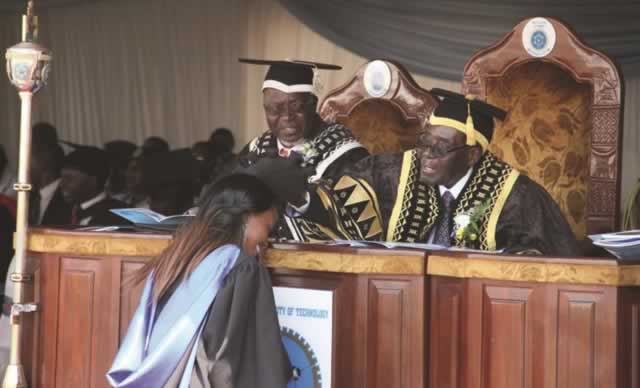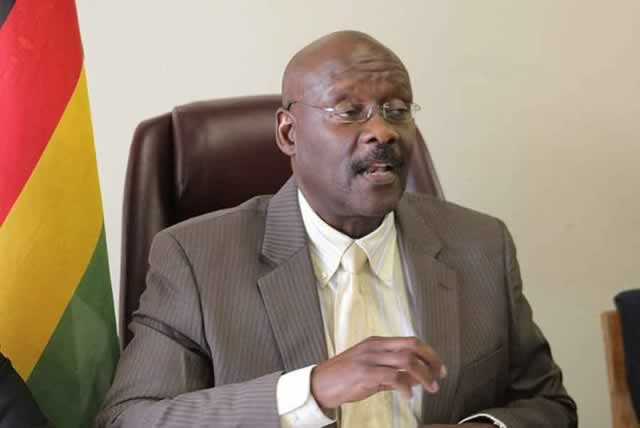President caps 1 418 at CUT


Chinhoyi University of Technology Chancellor President Mugabe caps Nomagugu Moyo, who graduated with a Bachelor of Science Degree in International Marketing, while Vice Chancellor Professor David Shumba looks on yesterday.
Walter Nyamukondiwa Chinhoyi Bureau
President Mugabe yesterday conferred degrees on 1 418 graduands at the 11th Chinhoyi University of Technology graduation ceremony.
The graduands successfully completed degrees in agricultural sciences and technology, art and design, engineering, hospitality and tourism, wildlife ecology and conservation and lifelong learning.
CUT vice chancellor Professor David Simbi said there was urgent need to re-orient the secondary education system so that it produces more students that could enrol in the science, technology and engineering undergraduate degree programmes.
“Our secondary school system remains a bottleneck to the recruitment and admission process of school leavers into higher education science, technology and engineering undergraduate degree programmes,” said Prof Simbi.
“Thus, the problem of low numbers in science and engineering is actually not unique to Chinhoyi University of Technology. It has to be considered at national level if a remedy is to be provided.”
He said the low number of science-oriented students had resulted in low uptake of degree programmes in the science and technology field.
He, however noted that there was a gradual increase in the number of students enrolling for science, technology and engineering related programmes.
“In order to make up the numbers in the science, technology and engineering programmes, the university now has an intake every semester. This makes us a fully semesterised institution of higher learning. This admission policy change has led to marginal increases in the number of students enrolled,” he said.
Prof Simbi said there was urgent need to address the supply side.
He said information technology should anchor development of innovation and entrepreneurial programmes.
CUT plans to introduce programmes such as data mining and analysis for decision making, process modelling and analysis, financing and entrepreneurial venture, digital market development for rural and urban settings, business intelligence technology development and analytics in the near future.
He said current and former students have joined hands to form registered companies that were operating in the field of mining, debt collection, the installation of solar tiles for renewable energy generation, broiler chick incubation, textile and clothing.
The university was also supporting research initiatives to contribute to the technological needs of the country.
“As part of the university’s contribution to the technological needs of the country, academics in the department of Fuels and Energy are at an advanced stage in their research on fluodised bed technology for waste incineration and coal combustion at Hwange and other thermal power stations in the country,” he said.
The research seeks to reduce the accumulation of waste layers during coal combustion to reduce maintenance downtime and improve power availability to the national grid.
A pilot combustion unit is under construction to confirm simulation models predictions.
There are also researches in the School of Agricultural Sciences and Technology to determine the efficacy of the Zhombwe plant tuber as an antibiotic for cattle which is used as a stockfeed additive for drought mitigation.
To strengthen research, Prof Simbi said CUT would launch a scholarship fund aimed at retaining a first class student from each of the schools to undertake graduate research studies up to Doctor of Philosophy level.
He said this would assist Zimbabwe to retain its best brains and advance the progression of innovative, technological and entrepreneurial initiatives for the benefit of society.
“The research projects will be supervised by Chinhoyi University of Technology academics and must address national needs and be relevant to the Zimbabwe Agenda for Sustainable Social Economic Transformation, ZIM-ASSET,” he said.
Prof Simbi said Zimbabwe should industrialise through indigenisation and the retention of talented youths to drive science, technology and entrepreneurship to create wealth and employment.
Chairman of the University Council Professor Rabson Mafoti thanked the Chinhoyi community for providing off-campus accommodation, furnishings and Wi-Fi connectivity for a conducive studying environment for students.
President Mugabe capped Master’s degree students and First Class students before mass capping the rest of the graduands.











Comments